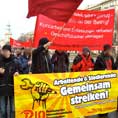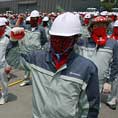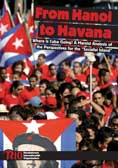



Tunisia, after the revolutionary fall of Ben Ali
| Categories: Tunisia
 An alarm signal for the arab autocrats and the imperialists
An alarm signal for the arab autocrats and the imperialists
The impact of the first revolutionary fall of a dictator in the Arab world in this century has reached not only the Maghreb and the Near East, but all the European governments are now extremely worried by the evolution of the situation. The process that led to the fall of Ben Ali goes back a long way. It is the Tunisian expression of an accumulated popular anger, intensified by the effects of the world economic crisis on the semi-colonial periphery against the regimes that arose from processes of winning independence. Decades ago, these regimes ceased to rely on vague nationalist rhetoric or invoking Arab socialism, to go over completely to being the best servants of imperialism and of its neo-liberal, privatizing offensive in recent decades, with everything that implies in terms of destitution and oppression for the subordinate classes. »»»»
 read comments (0)
read comments (0)
 The League for the FIfth International attempts to expel RIO members from the New Anticapitalist Left (NAL) of the Czech Republic
The League for the FIfth International attempts to expel RIO members from the New Anticapitalist Left (NAL) of the Czech Republic
The Prague group of the Revolutionary Internationalist Organization (RIO) formulated an open letter which named the current problems of the New Anticapitalist Left (NAL) in the Czech Republic. Our aim was to start a constructive debate about the future direction of the NAL and the work of all left-wing groups (RIO and also the League for the Fifth International, LFI) in this organization. »»»»

 Report from the Luxemburg-Liebknecht-Lenin-Weekend of RIO and the FT-CI in Berlin
Report from the Luxemburg-Liebknecht-Lenin-Weekend of RIO and the FT-CI in Berlin
The bourgeoisies across Europe are imposing austerity programs on the workers and youth, and Germany is no exception. But due to the momentary strength of German imperialism, which was able to bolster its position at the expense of other imperialist powers, and with the active support of the trade union bureaucracy, the struggles against this program have so far been limited. In this framework, it is important for revolutionaries in Germany to learn from the class struggle in other countries. With this objective, 40 people gathered at the international seminar of the Revolutionary Internationalist Organization (RIO) and the Trotskyist Fraction – Fourth International (FT-CI) on January 8 in Berlin. »»»»

 8 South Korean Labor Activists Face 5-7 Years in Prison
8 South Korean Labor Activists Face 5-7 Years in Prison
While we have important political differences with the SWLK and the initiators of this solidarity call, we unreservedly condemn the attempt by the South Korean state to persecute left communist activists for their political work. This kind of political repression by the capitalist courts can only be stopped by mass action of the workers and youth. Yet as internationalists we also support legal attempts to force the South Korean state to drop all charges. »»»»

 Open Letter to the League for the FIfth International
Open Letter to the League for the FIfth International
Dear comrades,
for many years, the Czech members of the League for the Fifth International (LFI) and the Czech members of the Revolutionary Internationalist Organization (RIO) have worked side by side in different campaigns (such as the No Bases Initiative and Students Against Racism). In addition to our friendly personal relations, we have always had similar political positions, since we are the only two left Trotskyist groups in the Czech Republic. »»»»

 After years, the first revolutionary process in an Arabic country is underway. Ben Ali’s Tunisian regime does not know what to do to curb the mobilization of the masses — unleashed because of the rise in prices of basic products — who, after yesterday’s announcements, are demanding his resignation. In Tunisia, a new revolutionary process is taking place, in which the vanguard is not Islamist, a process from below of young college graduates that are unemployed, lawyers, workers from industrial and mining cities, a two-hour general strike called for January 14, among other actions. »»»»
After years, the first revolutionary process in an Arabic country is underway. Ben Ali’s Tunisian regime does not know what to do to curb the mobilization of the masses — unleashed because of the rise in prices of basic products — who, after yesterday’s announcements, are demanding his resignation. In Tunisia, a new revolutionary process is taking place, in which the vanguard is not Islamist, a process from below of young college graduates that are unemployed, lawyers, workers from industrial and mining cities, a two-hour general strike called for January 14, among other actions. »»»»

 Manuel Georget and Vicent Duse speak in an interview about Platform 4 for the congress of the New Anticapitalist Party (NPA)
Manuel Georget and Vicent Duse speak in an interview about Platform 4 for the congress of the New Anticapitalist Party (NPA)
Manuel Georget and Vincent Duse are two of the most important workers’ representatives of Platform 4. Georget is general secretary of the CGT EGP Dreux and trade union delegate of the Philips Dreux TV manufacturing plant. The factory has recently been closed down after years of battle against layoffs and relocation, which ended with a short experience of production under workers’ control last January. Georget was a member of the Ligue Communiste Révolutionnaire (LCR), the forerunner of the NPA, for nearly 30 years. He headed the NPA slate in the Eure-et-Loir department in the last regional elections and is a member of the Collective for a Revolutionary Tendency (CTR) coordinating body. Duse is a worker at the Peugeot factory in Mulhouse, where more than 10,000 workers are employed, and for 10 years was the general secretary of the CGT in the factory. He is a member of the National Political Committee of the NPA and of the CTR coordinating body. »»»»

 On 16th December there will be a worldwide day of action with striking colleagues of the UPS in Istanbul and Izmir. Since 5th May the UPS workers in Turkey are in action and on strike. They fight because they have tried to unionize but were aggressively oppressed and 160 colleagues were layed off for this reason. Poor working conditions and low wages are the causes for their decision to unionize. »»»»
On 16th December there will be a worldwide day of action with striking colleagues of the UPS in Istanbul and Izmir. Since 5th May the UPS workers in Turkey are in action and on strike. They fight because they have tried to unionize but were aggressively oppressed and 160 colleagues were layed off for this reason. Poor working conditions and low wages are the causes for their decision to unionize. »»»»

 FRANCEBURNING
FRANCEBURNING
Blockades, factory occupations, mass strikes – what can we learn from the class struggle in France?
International Seminar: Saturday, January 8, 2:00-8:00pm
Mehringhof, Gneisenaustr. 2a, U6/U7 Mehringdamm, Berlin »»»»

 Raúl Castro has announced that the much-delayed congress of the Communist Party of Cuba (PCC) will take place in April 2011. The fifth congress of the PCC was held in October 1997, and the sixth has been postponed countless times. But after an interval of thirteen and a half years, the PCC’s (formally) highest body will finally meet. »»»»
Raúl Castro has announced that the much-delayed congress of the Communist Party of Cuba (PCC) will take place in April 2011. The fifth congress of the PCC was held in October 1997, and the sixth has been postponed countless times. But after an interval of thirteen and a half years, the PCC’s (formally) highest body will finally meet. »»»»

 Where is Cuba Going? A Marxist Analysis of the Perspectives for the “Socialist Island”
Where is Cuba Going? A Marxist Analysis of the Perspectives for the “Socialist Island”
Cuba seems like an anachronism in today’s world. Other formerly “socialist” states reintroduced capitalism in the upheavals of the 1990s. In Russia, the Communist Party was toppled and its system collapsed. In China and Vietnam, the Communist Parties themselves led a controlled process of reforms to reestablish a market economy. Cuba alone has maintained to this day an economy which is dominated not by the laws of the market but by a plan. Will Cuba experience a chaotic reintroduction of capitalism like in Russia? Or a controlled restoration like in China and Vietnam? Will it remain an “anachronism”? Or will it develop in an entirely new direction?
Introduction and Chapter 1: Cuba today
Chapter 2: The Cuban Revolution
Chapter 3: From olive green to red
Infobox: The Cuban Revolution began in 1917…
Chapter 4: Cuban Bonapartism
Chapter 5: A degenerate workers’ state
Chapter 6: The “Special Period”
Chapter 7: Stabilization
Chapter 8: The military, the bureaucracy and the party
Chapter 9: The development of the economy
Chapter 10: The trajectory of the Cuban regime
Chapter 11: The “Chinese” road
Chapter 12: Three possible roads
Chapter 13: Tasks of Marxists + Bibliography
The first draft of these theses was written by Wladek Flakin (RIO, Berlin) in April 2010 and discussed at RIO’s seminar on Latin America in June 2010 and its Summer Academy in August 2010. Based on these discussions the text was expanded by Victor Jalava (RIO, Kiel). Members of the Left Block (LiBRo) from Rostock, the Marxist Initiative (MI) from Berlin and the New Anticapitalist Left (NAL) from the Czech Republic contributed to the discussion. Following, we will publish one chapter from the theses every two days for a month.

